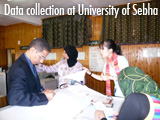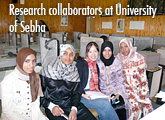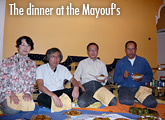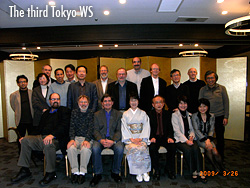The 11th International Pragmatics Conference is just around the corner. I hope you will come equipped with outfits for the winter weather.
I am presenting a paper in the panel called 'Emancipatory Pragmatics: The Search for Cultural Parameters in Interactional Discourse,' on Thursday, July 16th. The title of my talk is "'The coffee is ready': The logic of ba or field and language practice." The thesis of my paper is twofold: First, I argue that a speech act such as 'the coffee is ready' cannot be satisfactory explained by Speech Act Theory. Second, I argue that the cases such as these call for the logic of ba as an alternative framework for reductionism. The logic of ba is a useful frame of thinking to explain 'wakimae', the integral concept of linguistic politeness in a high context culture.
![Sitting-next-to-the-President-of-University-Sorbonne[2].jpg](http://sachikoide.com/blog/images/Sitting-next-to-the-President-of-University-Sorbonne%5B2%5D.jpg) Last September I gave talks at The Center for Ethics of Science and Technology in Chulalongkorn University, and The National Institute for Development Administration, both in Bangkok, Thailand, The University of Paris-Sorbonne in Paris, France and at Salento University, in Lecce, Italy.
Last September I gave talks at The Center for Ethics of Science and Technology in Chulalongkorn University, and The National Institute for Development Administration, both in Bangkok, Thailand, The University of Paris-Sorbonne in Paris, France and at Salento University, in Lecce, Italy.
In October my colleagues and I went to Sebha University, Libya to do research collaboration with students and faculty members. We were able to obtain 27 sets of the comparable discourse data called Mr. O Corpus in Libyan Arabic. The results of this research will be presented at the conference's plenary talk by Yasuhiro Katagiri, titled: "Finding Interactional Parameters: A Method of Emancipatory Pragmatics." Dr. Mayouf will be giving presentation on discourse data in Libyan Arabic in 'Emancipatory Pragmatics: The Search for Cultural Parameters in Interactional Discourse' panel.



 In March 25-27 of this year, we hosted The Third International Workshop on Emancipatory Pragmatics at Japan Women's University. On the first day, we focused on Libyan language and culture, and were honored to host inviting two cultural experts on Libyan culture. We also had extensive discussion on the freshly collected and transcribed Libyan Arabic discourse data. On the third day, we focused on the logic of ba. We were honored with the presence of Dr. Hiroshi Shimizu who pioneered the ba theory. Three participants came from the US, five came from Europe, one from Libya, and one from Korea.
In March 25-27 of this year, we hosted The Third International Workshop on Emancipatory Pragmatics at Japan Women's University. On the first day, we focused on Libyan language and culture, and were honored to host inviting two cultural experts on Libyan culture. We also had extensive discussion on the freshly collected and transcribed Libyan Arabic discourse data. On the third day, we focused on the logic of ba. We were honored with the presence of Dr. Hiroshi Shimizu who pioneered the ba theory. Three participants came from the US, five came from Europe, one from Libya, and one from Korea.
All these activities are meant to be part of an effort to 'let the wind blow from multiple directions' as I stated in 2007 in my opening address as president of the 10th IPrA in Goethenberg, Sweden. Here is an excerpt from my speech:
After I was elected President last year, I visited the University of Antwerp, where the headquarters of this organization have been situated since its founding, and discussed with Jef what we could do during the coming six years of my presidency. As a result of the fact that the new president was selected from the non-European, non-American members, we thought some new directions for the studies of pragmatics might be in order. One such new direction would be to change the direction of the academic debate from unidirectional to multidirectional. What I mean by this is that modern scholarship in pragmatics has originated in the West and been disseminated all over the world, while little knowledge has been gleaned from other parts of the world. Even though we acknowledge the great academic contributions from the West, it might be time for us to learn from different areas of the world, areas that have their own traditions, in order to attain a better understanding of the complexity of practice of the human race.
I am looking forward to meeting and learning from you at Melbourne.

Leave a Reply